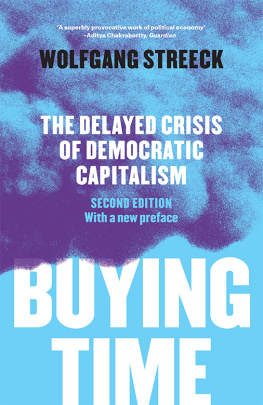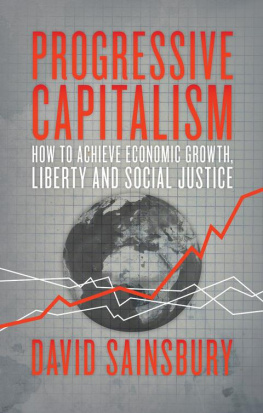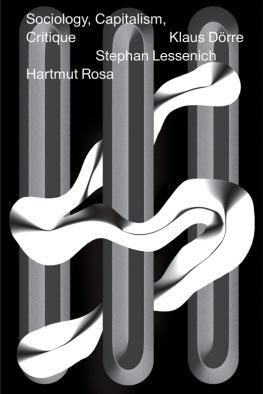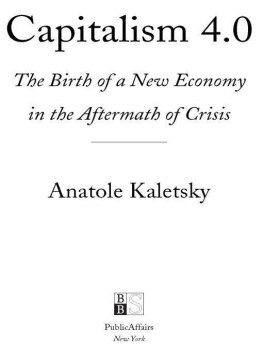I. ON SOCIAL ORGANIZATION
The social order of contemporary Western societies comprises capitalism as a system of social relations and liberal democracy as a system of political rule. Thus, capitalism can be combined with a variety of political systems (e.g., the democratic capitalism of the United States and Europe; Chinas autocratic capitalism). As a historically particular, modern social formation, capitalism is not to be reduced to market economy or market society.
The repertoire of capitalism is a unity of the following core elements:
1.Two systemic dynamics (dynamics pertaining to the social system):
(a) A constitutive dynamic (operative logic): the competitive production of profit. This combines three organizing principles: competition, profit-making, and production (the productivist, rather than creative, nature of worki.e., labor engaged in the production of commodities). The constitutive dynamic shapes notions of life-chances (for a successful life and an accomplished self), before these chances are distributed.
(b) An enabling dynamic of primitive appropriation: the appropriation of what is to be deployed in the competitive pursuit of profit.
2.Internal structure: institutions with structuring effect that enact the constitutive dynamic, such as private property, management of the means of production, and the free labor contract. These institutions configure the social relations and shape the distribution of life-chances in society.
3.Ethos: worldviews orienting behavior and giving it the meaning of rational enterprise under individual initiative. These enable capitalism to source its legitimacy from the correlation between entrepreneurial risks and opportunities in the distribution of life-chances in society (see also legitimation matrix).
Modalities of capitalism are historical configurations of the repertoire of capitalism. Changes occur when new circumstances create new social opportunities and risks, when the correlation between risks and opportunities is disturbed, or when new public perceptions emerge about the fair distribution of life-chances. There are four such sequential modalities:
- liberal capitalism (nineteenth century);
- welfare capitalism (most of the twentieth century);
- neoliberal capitalism (late twentieth century); and
- precarity capitalism (early twenty-first centurycurrent era).
Precarity capitalism is the latest historical articulation of the repertoire of capitalism. Its core features are: (1) generalization of precarity across social class, professional occupations, and income levels; (2) active redistribution of resources from weak economic actors to powerful ones by public authority in pursuit of global economic competitiveness; (3) fear-based motivation to engage in the system. This modality of capitalism is marked by two internal contradictions: surplus employability (the simultaneous increase of the decommodification potential of modern societies and the increase of commodification pressures) and acute job dependency (the tension between decreased availability of good jobs and increased reliance on a job as a source of livelihood).
Liberal democracy is a political system: that is, an institutionalized system of political rule. Its repertoire consists of:
- Operative logic/principle: the competitive pursuit of public office;
- Structures (institutions with structuring effect) enacting the operative logic, such as popular suffrage and competitive elections, constitutionally codified basic rights, and accountable government; and
- Ethos: popular sovereignty understood as a rational enterprise of collective self-determination. This enables democracy to source its legitimacy from the values of individual autonomy and equality of citizenship (see also legitimation matrix).
Socialism is a system of social relations based on full socialization of the means of production, which are held either as communal property or by the central public authority.
II. ON LEGITIMACY
I deploy four concepts to discuss legitimation as a process in which the subjects of a given social order endorse it as being just: ethos, legitimation matrix, framework of political reference, and legitimacy deal.
Ethos is the unity of cognitive and normative orientations regarding views about truth, appropriateness, and acceptability. It is the societal common sense or rationality.
The legitimation matrix is the set of normative resources from which the legitimacy of the social order is sourcedits ground rules of fairness. The legitimation matrix of a social order is composed of a set of broadly shared views about life-chances and their fair distribution. Since its inception, capitalism as a system of social relations has relied on the following ground rule: in an (idealized) market society, risks and opportunities are to be correlated for every participant. The legitimation matrix of liberal democracy as a political system stipulates the mutual accommodation between individual autonomy and collective self-determination. This arrangement is secured through another ground rule: equal citizenship. The legitimation matrix of democratic capitalism (a social order with capitalism as a social system and democracy as a political system) combines the rules that opportunities and risks be correlated and that all members have a say over the way life-chances are distributed. The legitimation matrix is the repository for the process of the politicization of social grievances into demands for policy action addressed to public authority.
The framework of political reference is a broader societal understanding (political common sense) regarding what counts as a politically relevant social concern (e.g., poverty, inequality, crime, environmental degradation). The legitimacy deal is located within this framework.
The legitimacy deal is the explicit legitimacy relationship between public authority and citizens. Located within the framework of political reference, it specifies which actions public authority is to perform for society in order to secure the fair distribution of life chances (political deliverables), as understood within the legitimation matrix. The legitimacy deal alters when the legitimation matrix is threatened, in order to safeguard it. This enables considerable changes within a given social system (engenders modalities of the system) in order to keeps it intact.
The four concepts are linked to each other in a descending range of validity and ascending range of specificity. That is, ethos has the largest scope of operation and is the least specific notion, while the legitimacy deal has the narrowest scope of validity and is the most specific notion among the four. They all enable the politicization of a social phenomenon into an object of policymaking.
Politicization is the process in the course of which a social phenomenon gains public notice and eventually becomes a salient object of policy.
The right to politics is the right to have a grievance of injustice be considered a relevant social concern and a valid object of policymaking. It secures an ongoing process of politicization via a continuous contestation of societys binding rules and practices. The spectrum of practices through which a grievance gains political relevance spans from deliberation to insurrection. The right to politics, together with the right to have rights (Arendt) and the right to justification (Forst) constitute a distinct category I call meta-rights; these are constitutive of the political, while ordinary rights (including the fundamental rights to life and liberty) determine the quality of the political (i.e., render political membership more rigorous).












